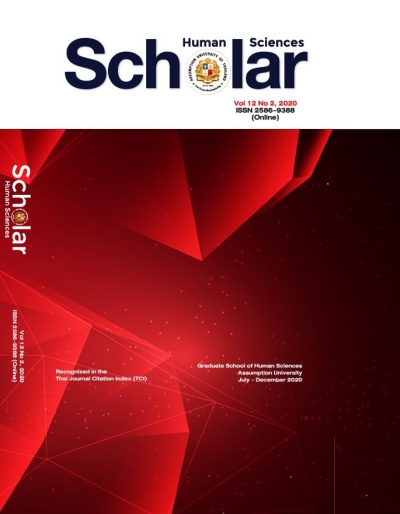The Relationship of Attitudes Toward Recreational Reading in English and Attitudes Toward Academic Reading in English with Reading Achievement of Grades 3 to 5 English as a Foreign Language Students at an International School in Bangkok, Thailand
Keywords:
Attitudes Toward Recreational Reading in English, Attitudes Toward Academic Reading in English, Reading Achievement, Elementary Reading Attitude Survey (ERAS)Abstract
The purpose of this study was to determine the relationship among attitudes toward recreational reading in English and attitudes toward academic reading in English with reading achievement of Grades 3 to 5 English as a foreign language for students at an international school in Bangkok, Thailand. The Elementary Reading Attitude Survey (ERAS) was used to collect data from 24 Grade 3 students, 20 Grade 4 students, and 23 Grade 5 students during the first term of 2018-2019. Descriptive statistics such as means, standard deviations, and Pearson product-moment correlation coefficient were used to analyze the data. The findings showed that Grades 3 to 5 students at this school had a high level of attitudes toward both recreational reading in English and academic reading in English. Attitudes toward recreational reading in English were found to correlate significantly with attitudes toward academic reading in English, while reading achievement did not significantly correlate with students’ reading attitudes in English. Recommendations for practice and future research are provided.
References
Adams, M. (1990). Beginning to read: Thinking and learning about print.
Alexander, E. (2016). Teacher evaluation: The relationship between performance evaluation ratings and student achievement (Unpublished doctoral dissertation). Liberty University, Virginia, United States of America.
Bandura, A. (1989). Social Cognitive Theory. In R. Vasta (Ed.), Annals of child development (pp. 1-60).
Barber, T. D. (2017). The relationship between MAP assessment and PASS results of eighth grade (Unpublished doctoral dissertation). Walden University, Minnesota, United States of America.
Baron, M. (2016). Why digital reading is no substitute for print. The New Republic.
Bastug, M. (2014). The structural relationship of reading attitude, reading comprehension and academic achievement. International Journal of Social Science and Education, 4(4), 931-946.
Chotitham, S. & Wongwanich S. (2014). The reading attitude measurement for enhancing elementary school students’ achievement. Procedia Social and Behavioral Sciences, 116, 3213-3217.
Darasawang, P. (2007). English language teaching and education in Thailand: A decade of change. In D. Prescott (Ed.), English in Southeast Asia: Varieties, literacies and literatures (pp. 187-204).
Education First. (2018). English proficiency index. Education First.
Fishbein, M. & Ajzen, I. (1975). Introduction. In Belief, attitude, intention, and behavior: an introduction to theory and research 1, 1-16.
Fredrickson, T. (2016, December). Pisa test rankings put Thai students near bottom of Asia. Bangkok Post.
Hanford, J. (2016). A correlational study: The relationship between school climate, connectedness, and reading achievement of elementary school students [Abstract]. Institute of Education Sciences, 223. Abstract retrieved from Abstracts in ProQuest LLC Dissertation. (Accession Number ED571064)
Kazelskis, R., Thames, D., Reeves, C., Flynn, R., Taylor, L., Beard, L., & Turnbo, D. (2005). Reliability and stability of elementary reading attitude survey (ERAS) scores across gender, race, and grade level. The Professional Educator, 27(1 & 2), 29-37.
Khamis, H. (2008). Measures of association how to choose? Journal of Diagnostic Medical Sonography, 24(3), 155-162.
Keskin, H. K. (2013). Impacts of reading metacognitive strategies and reading attitudes on school success. International Journal of Academic Research, 5(5), 312-317.
Lungley, M. & Lynch, R. (2017). The relationship between grades 8-12 students’ motivation for self-selected reading in English and academic achievement at Bangkok Christian International School, Thailand. Scholar Human Sciences Theses, 9(2), 203-217.
Lwin, Z. & Lynch, R. (2015). A study of elementary level English as a foreign language students’ attitudes towards reading for pleasure in English at Bangkok Christian International School, Thailand. Scholar Human Sciences Theses, 7(2), 39-56.
Mathewson, G. (1994). Model of attitude influence upon reading and learning to read [Abstract]. American Psychological Association, 1131-1161.
McKenna, M. & Kear, D. (1990). Measuring attitude toward reading: A new tool for teachers. In The reading teacher, 43(9), 626-639.
McKenna, M., Kear, D., & Ellsworth, R. (1995). Children’s attitudes toward reading: A national survey. Reading Research Quarterly, 30(4), 934-956.
Northwest Evaluation Association. (2011). Technical manual for measures of academic progress (MAP) and measures of academic progress for primary grades (MPG) [PDF file].
Northwest Evaluation Association. (2015). 2015 NWEA measures of academic progress normative data [PDF file].
Northwest Evaluation Association. (2017). NWEA A parent’s guide to MAP [PDF file].
National Institute of Educational Testing Service. (2018). O-NET: ordinary national education test.
Organization for Economic Cooperation and Development. (2018). Programme for international student assessment. OECD.
Pace, J. & Mellard, D. (2016). Reading achievement and reading efficacy changes for middle school students with disabilities through blended learning instruction. Journal of Special Education Technology, 31(3), 156-169.
Power, J. B. (2011). Effects of study activities on academic achievement in university students in Thailand. Manusya: Journal of Humanities Regular, 14(1), 1-22.
Schwab, K. (2016). The global competitiveness report 2016-2017 [PDF file]. Retrieved from http://www3.weforum.org/docs/GCR2016-2017/05FullReport/TheGlobalCompetitivenessReport2016-2017_FINAL.pdf
Shaw, L. (2013). Educators debate validity of MAP testing. The Seattle Times.
Smith, M. C. (1990). A longitudinal investigation of reading attitude development from childhood to adulthood. The Journal of Educational Research, 83, 211-219.
Tunde-Awe, B. M. (June 2014). Relationship between reading attitudes and reading comprehension performance of secondary school students in Kwara State, Nigeria. American Research Institute for Policy Development, 3(2), 203-215.
Todtfeld, D. & Weakley, W. (June 2014). The impact of instructional reading technology programs on student reading achievement (Unpublished master’s thesis). Northwest Missouri State University, Missouri, United States of America.
Volpe, F. (2014). The role of academic achievement motivation in predicting performance on the northwest evaluation association’s measure of academic progress. Mindsets: Incremental vs. entity beliefs about intelligence (Unpublished doctoral dissertation). University of New Mexico, New Mexico, United States of America.
Ward, S. L. (2013). An examination of a relationship between reading attitudes and reading achievement for a group of sixth grade students (Unpublished doctoral dissertation). Mississippi State University, Mississippi, United States of America.




